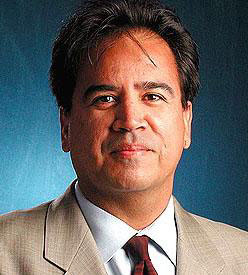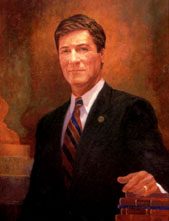St. Petersburg Times' journalist Paul de la Garza, 44 dies
 There are conversations that stay with you for a long time. My first one with Paul de la Garza certainly has.
There are conversations that stay with you for a long time. My first one with Paul de la Garza certainly has.I met Paul in Bogota about seven years ago when he was The Chicago Tribune’s guy in MexCity. It was at a gathering of local and foreign journalists in the home of Maria Ines Carrizosa who had, arguably, the best “salon” in the city.
Paul was sitting next to my great pal Tod Robberson, at the time the Dallas Morning News’ Lat Am correspondent. The two had known each other since Tod’s days with the Washington Post in Mexico.
As I came into the room, Tod motioned to me to join them. I took some ribbing from Tod for the shirt I was wearing – an oversized blue and white striped jersey that had belonged to my brother Mark.
“Gimme a break,” I said. “It’s comfortable,” and comforting, I might have added…
I sat down next to Paul and we soon began what turned out to be a long and poignant conversation.
Robberson was talking about his dog, Buster (who, according to Tod, was an extraordinarily gifted beast, something that led many of us to suspect that Buster was not only his research assistant but possibly even his ghost writer.) Paul mentioned that his own dog had just died. “Sorry,” I said.
Turns out that the dog had belonged to Paul’s brother, who had died a few years before. “Oh, I understand—my brother died last year,” I said, as I tugged at my jersey (and glared at Robberson.)
“Yeah, well, it’s a bit different,” Tod said, somewhat hesitantly.
But Paul didn’t hesitate. He looked at me and said gently, “My brother was murdered.”
After my brother died I discovered that mentioning the death of a beloved younger sibling was either an icebreaker or a great way to “freeze” a conversation. Paul’s frankness awoke compassion as much as curiosity in me. He was more than ready not only to talk about his brother, but also about the circumstances of his brother’s death.
Paul told me that his brother was murdered when he went out one evening to buy soft drinks for himself and his parents. He was carjacked, –probably for the new car he drove, Paul said– placed in the trunk and taken for a joy ride before his killers shot him and threw his body in the ocean.
The following morning a couple walking on the beach spotted the body and called the police.
When the police went to inform the parents that their son was dead, Paul’s father suffered a heart attack.
From what I remember, the killers were soon caught, probably because they were driving the stolen car.
At the time of the murder, Paul, a native of south Texas, was living in Chicago, working for the AP. He took a leave of absence to be with his family while the accused killers were tried for the murder. Paul attended the trial every day, wheeling his infirm father into the courtroom and parking the wheelchair up front, in full view of the jury.
The two men were found guilty and sentenced to life in prison. Paul called in the story of the verdict to the AP. That last bit made a lot of sense to me. It was the last thing that was going to be done for his brother, and Paul wanted to make sure it was done well.
I asked Paul why he, the youngest of all the children (there were six in the family) was so involved in the case and the trial. “I’m the only one with an education,” he replied. He had studied at the University of Texas; none of the other kids in the family had gone on to university.
We got to talking about our backgrounds and families. His dad was a shrimper, his mom a waitress or chambermaid, if I remember. Good, hardworking people, as he described them.
One of Paul’s jobs was as a cops reporter, a job in which he often interviewed victims of violence and family members of murder victims. He told me about covering the unveiling of a monument for murder victims and how he approached a woman to interview afterwards. She tried to brush him off, saying, “You wouldn’t understand,” to which Paul replied, “Actually, I would.”
Our conversation moved on to other things when Paul pointed to my belly – I was five months pregnant. “You’re first?” he asked. My second, I said. “You got kids?” I asked. He told me that he and his wife were in the process of adopting in Mexico.
We talked a while longer and I dropped him off at his hotel. We exchanged cards, said we’d keep in touch, but only exchanged a few emails from time to time. I heard more about him than from him over the years. He and his wife adopted two kids, moved to DC (where he worked for the St. Petersburg Times) and then to Tampa.
I had not seen Paul in years until, as luck would have it, we ran into each other this past June when I was on a panel at the National Association of Hispanic Journalists convention. (My panel was on at the same time as one on Roberto Clemente. I had secretly hoped no one would show up for my panel so I could go to that panel instead.)
I saw Paul at the back of the room, and when the panel was over I waved to him. I was delighted to see him. He introduced me to Georgia, his wife, and showed me photos of his two children, Monica and Carlos. I told him we’d go visit them “one of these days.”
On Sunday, Paul died suddenly of a heart attack at the age of 44. He will be remembered for his talent and for his compassion.
And I will always remember, and cherish, that first conversation.
 Blog
Blog



